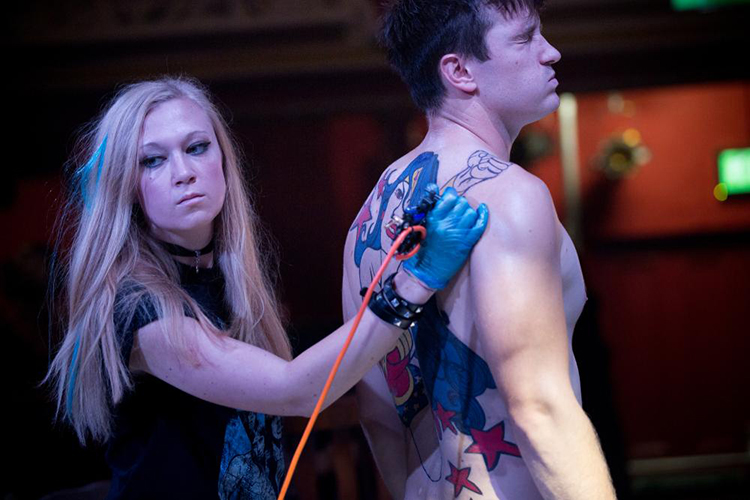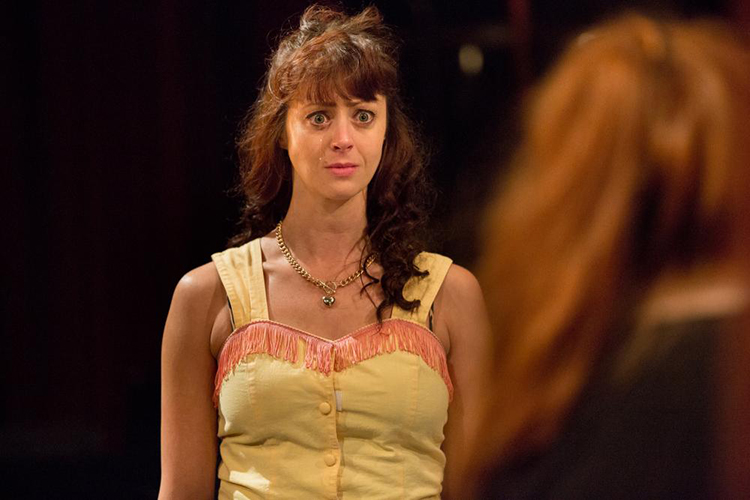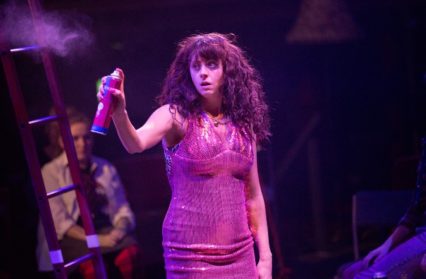Phil Morris offers a disappointed review of Rachel Trezise’s first stage play Tonypandemonium with National Theatre Wales.
In this age of austerity, when the poorest areas in Wales are afflicted by government and council cutbacks, it is heartening to find National Theatre Wales making a considerable creative investment in the Rhondda Valley. Rachel Trezise’s first stage play Tonypandemonium forms the centrepiece of a month of celebrations and workshops – culminating in Dirty, Gifted and Welsh the weekend of 18th & 19th October. While the efforts of National Theatre Wales to engage with the Rhondda community must be commended, Tonypandemonium is quite frankly a disappointment given the considerable literary talent of Trezise, who is one of the most idiosyncratic and compelling writers of prose that Wales has produced in the past twenty years.
As its title suggests, Tonypandemonium is raucous, energetic and, at times, chaotic, both in terms of its text and production. It is Rachel Trezise’s first foray into theatre, and has all the strengths and weaknesses of a first play; it is personal, honest, passionate, angry and heartfelt on the one hand, but on the other lacks certain elements of craft such as dramatic rhythm and depth of characterisation. Described by its author as ‘a love letter to my mother’ Tonypandemonium has a mosaic-like, autobiographical structure of short scenes that recount Trezise’s childhood struggles to cope with the alcoholism and sexual promiscuity of her neglectful and damaged mother.

Photo by Mark Douet / National Theatre Wales
A tight focus on this fractious mother-daughter relationship provides the play with an emotional centre that is occasionally moving, but the themes of alcohol dependency, poverty, mental illness and social breakdown – that have a particular, though not exclusive, relevance to life in the Welsh valleys – are touched upon but remain tantalisingly unexplored. For long stretches, the play serves as a means by which the author can express her long-held resentment of her mother’s dysfunction. This would not necessarily be a bad thing provided that such resentment is transmogrified through art into something poetic and insightful. Unfortunately, the dialogue in Tonypandemonium does not rise above a flattened-out realism that is too often banal; when what is required is an imaginative arranging of colloquialisms and dialect into a convincing though poetically-heightened rendering of demotic speech.
The production, directed by Mathilde Lopez, is staged in-the-round in a reconfigured Park and Dare main auditorium – the intention being to immerse the audience in the action of the play, and place the play at the heart of its community. The cast often venture out into where the audience sits, and launch their lines (sometimes with the aid of microphones) from a multitude of vantage points, so that for several scenes half of the action takes place behind a large section of the audience. This is a profoundly irritating piece of staging that only works to dilute the family intimacy indicated in the text. A soundtrack replete with nineties Indie classics occasionally obscures lines spoken by the cast, who all struggle with vocal projection. Lopez’s direction is not sure-footed enough to balance her restless attempts to represent the shifting timelines of the play with the emotional power of its story. This is no reflection on the stage management team, ably led by Donna Reeves, who execute their sound and lighting cues with commendable sensitivity and aplomb.

Photo by Mark Douet / National Theatre Wales
The cast cannot be faulted for their performance energy. Siwan Roberts projects the sexual charisma of the mother figure, Debs, while maintaining an emotional frailty that lends what might have been an otherwise unsympathetic character some humanity and dimension. Adam Redmore as feckless step-father Tommy is an enjoyable comic foil. Treorchy schoolgirls Tamara Brabon and Molly Elson play younger versions of the protagonist Danielle with conviction, although the latter is too often tasked with simply ranting at her mother. Try as they might, the cast cannot flesh out what are essentially two-dimensional characters. Even on press night there were many local people in the audience, who could be observed chuckling and nudging each other in recognition at certain characters or references in the play, or at familiar situations encountered in their own lives. It is this familiarity that is the key problem with Tonypandemonium, it speaks honestly, but fails to offer its audience anything new that might challenge common assumptions and misconceptions about life in the Rhondda.
The story Trezise presents is a sadly all-too-common one of addiction, parental neglect and the ultimate survival of a child against the odds. The final reconciliation between Debs and Danielle at the end is motivated by the indestructibility of filial love, rather than recognition by the daughter that her mothers’ alcoholism may stem from inherited mental illness, or result from a need to numb the pain of earlier family tragedies. The idea that Danielle – Trezise’ stage avatar – might attribute some of her creativity and independence from the chaos and tumult of her childhood is frustratingly unexamined.
Perhaps Trezise is too close to her material to invest her characters with the sub-textual motivations and hidden contradictions that are necessary to creating drama that, in transcending its real life context, communicates with an audience in a sophisticated and challenging manner. The struggles of working-class people – who are plainly as complex and interesting as those of the middle and upper classes – deserve special attention, especially in these harsh economic times. Tonypandemonium lacks the distinctive authorial voice that has made Rachel Trezise a justifiably celebrated writer, and so it is not the classic valleys play that the people of the Rhondda deserve, although it might provide the inspiration for someone to attempt to write one. Should that writer emerge National Theatre Wales should pay as much attention to the development of their craft, as to the development of the new audiences it has discovered across Wales.
Banner photo by Mark Douet / National
Theatre Wales
Phil Morris is a regular writer at Wales Arts Review.
For more Wales Arts Review coverage of National Theatre Wales, including news, reviews, and interviews, click here.












